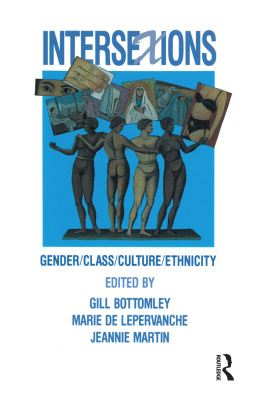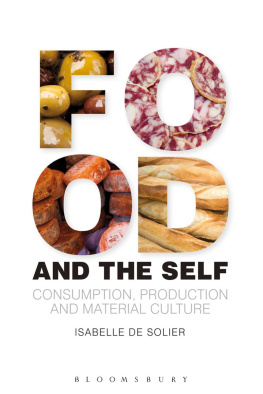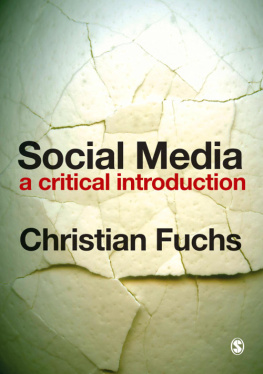First published 1995 by Prentice Hall/Harvester Wheatsheaf
Published 2013 by Routledge
2 Park Square, Milton Park, Abingdon, Oxon OX14 4RN
711 Third Avenue, New York, NY 10017, USA
Routledge is an imprint of the Taylor & Francis Group, an informa business
Text copyright (Introduction and Editorial Material)
Stevi Jackson and Shaun Moores 1995
All rights reserved. No part of this book maybe reprinted or reproduced or utilised in any form or by any electronic, mechanical, or other means, now known or hereafter invented, including photocopying and recording, or in any information storage or retrieval system, without permission in writing from the publishers.
Notices
Knowledge and best practice in this field are constantly changing. As new research and experience broaden our understanding, changes in research methods, professional practices, or medical treatment may become necessary.
Practitioners and researchers must always rely on their own experience and knowledge in evaluating and using any information, methods, compounds, or experiments described herein. In using such information or methods they should be mindful of their own safety and the safety of others, including parties for whom they have a professional responsibility.
To the fullest extent of the law, neither the Publisher nor the authors, contributors, or editors, assume any liability for any injury and/or damage to persons or property as a matter of products liability, negligence or otherwise, or from any use or operation of any methods, products, instructions, or ideas contained in the material herein.
ISBN 13: 978-0-13-433343-4 (pbk)
Library of Congress Cataloging in Publication Data
The politics of domestic consumption: critical readings/edited by Stevi Jackson and Shaun Moores.
p. cm.
Includes bibliographical references and index.
ISBN 0134333438
1. Consumption (Economics) 2. Households. 3. Family.
I. Jackson, Stevi. II. Moores, Shaun.
HC79.C6P63 1995
British Library Cataloguing in Publication Data
A catalogue record for this book is available from the British Library
ISBN 0134333438
Stevi Jackson and Shaun Moores
Our reader pulls together a previously dispersed range of work on various aspects of domestic consumption and the extracts we have chosen to include in this volume come, like us, from rather different academic backgrounds. On the one hand, then, there are pieces drawn from a growing body of critical principally feminist sociological writings on the family1 and household life. On the other, there is a series of pieces here which can be located within the emerging interdisciplinary field of cultural studies work which has also focused its attention on everyday practices in the home, such as those associated with the use of media technologies. Although no clear dividing line separates these two areas of academic endeavour, which we would argue share many of the same basic concerns, it is nevertheless the case that researchers in those different fields tend to carry out their investigations in relative isolation from each other. So a central aim of ours in editing the book has been to make connections and thereby demonstrate shared interests. In doing so, we hope this reader will constitute more than simply the sum of its several parts and that it might help to open up a new, enlarged space for common teaching and research programmes around the theme of domestic consumption.
In one way or another, the contributions to this collection whether they have their roots in sociology, womens studies or media and cultural studies approach house-holds with a strong emphasis on relations of power and social inequality. It is in this sense that we speak broadly about a politics of domestic consumption, because readings reprinted in the book raise important questions about the gendered and generational dynamics of family life or about relations between households of different types, across divisions of class and ethnic culture. However, the necessary emphasis on power and structures of constraint does not blind all contributors to the frequently creative dimensions of domestic consumption: the active appropriation of consumer goods in everyday contexts and the construction of places called home. Our own perspective is one which recognizes a dialectic of creativity and constraint of agency and structure in the making of modern household cultures.2
A further, closely related connection which we hope to highlight by assembling this book is that between the material and symbolic aspects of daily domestic life. Whilst our intention is certainly not to propose a reductionist model of the household in which the latter is seen only as a pale reflection of the former we do believe that investigations into the cultural significance of objects and practices in the home need to be grounded in an understanding of economic resource distribution. They must also consider social patterns in the division of domestic labour and leisure. This is because opportunities for consumption in families are not equally available to all their members and there will be significant differences in the amount of time, space and money that family members have access to. Indeed, the physical environment of the home itself marks an important intersection of the material and the symbolic, for it is both a bounded spatial area and a place that is lived in and made meaningful by its inhabitants. A crucial point for us, though, is that the cultural meanings they produce will inevitably vary as a consequence of their positions within hierarchies of power.
Given our view of the need to ground consumption studies in debates about household resource distribution, we have organized the collection so that it begins with a section on the economics of the domestic sphere. This is followed by writings on food and clothing practices, patterns of leisure and media reception, and the interpretation of household technologies before the book is concluded with a more general look at symbolic constructions of the modern home. The readers five section headings provide us with subtitles for this introductory essay, in which we now discuss our chosen pieces and situate them within their respective intellectual and political traditions charting the interrelationship between them in greater detail. Finally, we assess the prospects for future developments in the study of domestic consumption, indicating gaps in the existing research literature.







